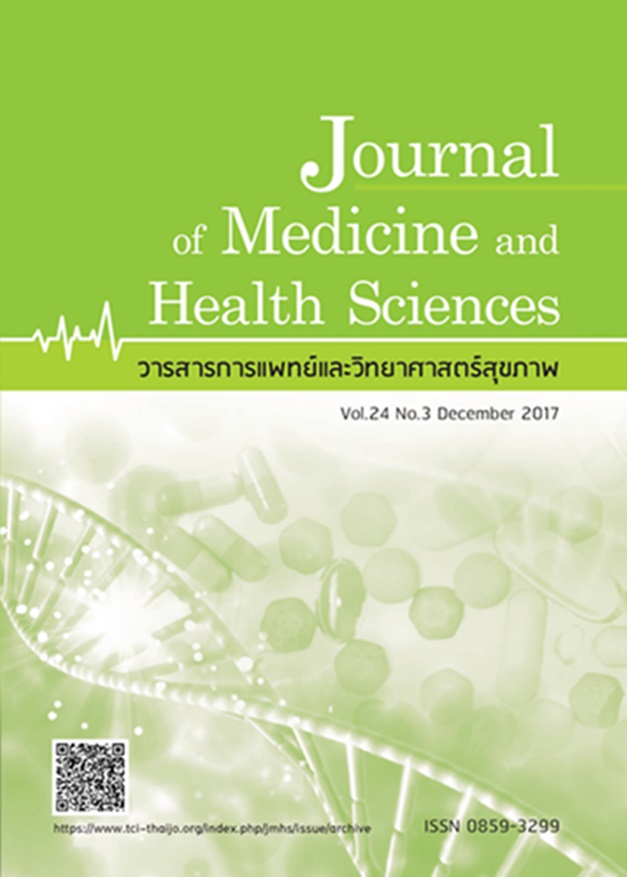รายงานผู้ป่วยโรคคาวาซากิที่ไม่ตอบสนองต่อการรักษามาตรฐาน (refractory Kawasaki disease) และมีการโป่งพองของหลอดเลือดโคโรนารี ซึ่งตอบสนองต่อยา infliximab
คำสำคัญ:
โรคคาวาซากิ โรคคาวาซากิที่ไม่ตอบสนองต่อการรักษามาตรฐาน ยาอินฟลิซิแมบ การโป่งพองของ หลอดเลือดโคโรนารี, Kawasaki disease, refractory Kawasaki disease, infliximab, coronary artery aneurysmบทคัดย่อ
รายงานผู้ป่วยเด็กชายอายุ 1 ปี 11 เดือน ได้รับการวินิจฉัยว่าเป็นคาวาซากิ มีอาการไข้สูง ท้องเสีย ตาแดง ปากแดง ผื่น ต่อมน้ำเหลืองบริเวณคอด้านขวาอักเสบ มือและเท้าบวม พบการโป่งพองของหลอดเลือด โคโรนารี 2 เส้น อาการของผู้ป่วยไม่ตอบสนองต่อการรักษาด้วยยา intravenous immunoglobulin (IVIG) 3 ครั้ง และ pulses methylprednisolone 3 ครั้ง แต่ตอบสนองดีโดยอาการไข้ ท้องเสีย และปากแดงหายไปใน 24 ชั่วโมงหลังได้รับการรักษาด้วยยา infliximab 1 ครั้ง ซึ่งเป็น monoclonal antibody ต่อ tumor necrosis
factor alpha
This case report describes a 1 year 11 month-old boy with refractory Kawasaki disease. He presented with prolong high grade fever, diarrhea, red eyes, dry cracked lips, rash, left lateral neck mass, hands and feet swelling and two coronary artery aneurysms. Treatment with three doses of intravenous immunoglobulin and three pulses of methylprednisolone were not responded. Finally, the patient was responsive to a single dose of infliximab, a monoclonal antibody against tumor necrosis factor alpha.
เอกสารอ้างอิง
et al. Diagnosis, treatment, and longterm management of Kawasaki disease: a
statement for health professionals from
the Committee on Rheumatic Fever,
Endocarditis, and Kawasaki Disease,
Council on Cardiovascular Disease in
the Young, American Heart Association.
Pediatrics 2004;114(6):1708-33.
2. Egami K, Muta H, Ishii M, et al.
Prediction of resistance to intravenous
immunoglobulin treatment in patients
with Kawasaki disease. J Pediatr
2006;149(2):237-40.
3. Uehara R, Belay ED, Maddox RA, et
al. Analysis of potential risk factors
associated with nonresponse to initial
intravenous immunoglobulin treatment
among Kawasaki disease patients in
Japan. Pediatr Infect Dis J 2008;27(2):155-
60.
4. Wright DA, Newburger JW, Baker A, et
al. Treatment of immune globulinresistant Kawasaki disease with pulsed
doses of corticosteroids. J Pediatr
1996;128(1):146-9.
5. Raman V, Kim J, Sharkey A, et al. Response
of refractory Kawasaki disease to pulse
steroid and cyclosporin A therapy.
Pediatr Infect Dis J 2001;20(6):635-7.
6. Hung JJ, Chiu CH. Pulse methylprednisolone therapy in the treatment
of immune globulin-resistant Kawasaki
disease: case report and review of the
literature. Ann Trop Paediatr 2004;
24(1):89-93.
7. Lang BA, Yeung RS, Oen KG, et al.
Corticosteroid treatment of refractory
Kawasaki disease. J Rheumatol 2006;
33(4):803-9.
8. Kim JY, Kim HJ. A Case of Kawasaki Disease
with Coronary Aneurysm Responding to
the 4th IVIG Treatment. Case Rep Cardiol
2014;2014:821812.
9. Wallace CA, French JW, Kahn SJ, et
al. Initial intravenous gammaglobulin
treatment failure in Kawasaki disease.
Pediatrics 2000;105(6):E78.
10. Levin M, Burgner D. Treatment of Kawasaki
disease with anti-TNF antibodies. Lancet
2014;383(9930):1700-3.
11. Burns JC, Best BM, Mejias A, et al.
Infliximab treatment of intravenous
immunoglobulin-resistant Kawasaki
disease. J Pediatr 2008;153(6):833-8.
12. Oishi T, Fujieda M, Shiraishi T, et al.
Infliximab treatment for refractory
Kawasaki disease with coronary artery
aneurysm. Circ J 2008;72(5):850-2.
13. Son MB, Gauvreau K, Burns JC,
et al. Infliximab for intravenous
immunoglobulin resistance in Kawasaki
disease: A retrospective study. J Pediatr
2011;158(4):644-9.
14. McCrindle BW, Rowley AH, Newburger
JW, et al. Diagnosis, treatment, and
long-term management of Kawasaki
d i s e a s e : a s c i e n t i fi c s t a t e m e n t
for health professionals from the
American Heart Association. Circulation
2017;135(17):e927-99.
15. Kobayashi T, Inoue Y, Takeuchi K,
et al. Prediction of intravenous
immunoglobulin unresponsiveness
in patients with Kawasaki disease.
Circulation 2006;113(22):2606-12.
16. Sano T, Kurotobi S, Matsuzaki K, et al.
Prediction of non-responsiveness to
standard high-dose gamma-globulin
therapy in patients with acute Kawasaki
disease before starting initial treatment.
Eur J Pediatr 2007;166(2):131-7.



